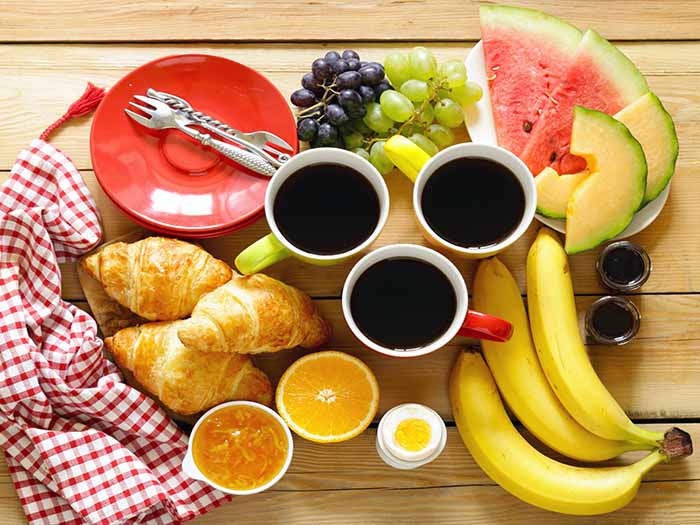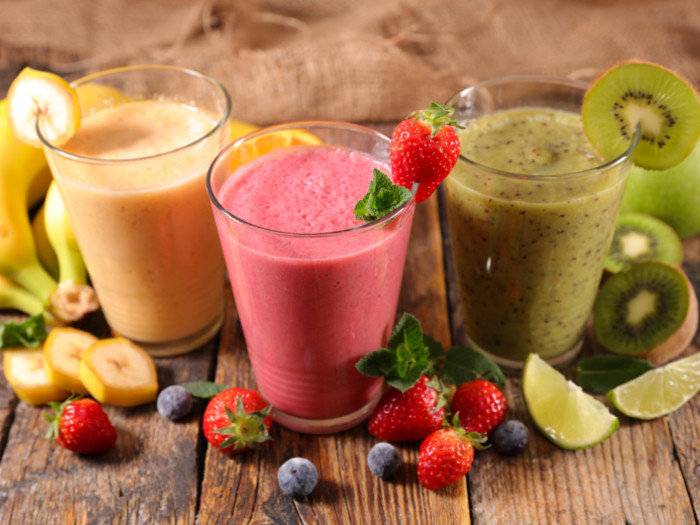Modern nutritional research has proven what alternative health care providers have claimed for ages: Food is medicine. What people choose to consume doesn’t only impact body weight — it also produces effects in the circulatory, digestive, and nervous systems. Making dietary changes can improve immune function, balance hormonal fluctuations, and boost negative moods.
Many people know what foods we should avoid, but refraining from eating an entire tub of Ben & Jerry’s is only half the battle. The other half involves including powerful superfoods into our daily meals. Try adding some or all of the following foods during breakfast to enjoy an energy boost and a healthy glow throughout the rest of the day.
Who Eats a Salad for Breakfast?
When most people think about breakfast, kale doesn’t exactly come to mind. But this leafy veggie packs a nutrient-rich punch to energize folks not just during the early hours but all day long. Kale contains more than the recommended daily amount of vitamins A, C, and K, and it’s loaded with age and cancer-fighting antioxidants.
Adding kale to breakfast doesn’t need to mean sipping on a smoothie that resembles pond scum. Easily whip together a killer kale breakfast skillet loaded with filling protein. Experiment with adding in colorful sweet pepper strips, Bermuda onion slices, and even turkey bacon crumbles to start the day the healthy way.

Low-calorie and high-fiber fresh fruit is good breakfast food. Photo Credit: Shutterstock
Eggs Are Still Incredible
Eggs have a bit of a mixed reputation among nutritionists, but those not suffering from heart disease can safely put omelets back on the breakfast menu. Eggs do contain high levels of cholesterol, but recent studies suggest that the consumption of eggs has a negligible effect on our own LDL cholesterol levels. [1]
Eggs pack a ton of beneficial nutrients into a tiny 70 calories. They contain omega-3 fatty acids requisite for brain function as well as lutein, a carotenoid that may slow the progression of certain eye diseases. Remember to always store eggs in the refrigerator and test the freshness of iffy ones by submerging them gently in a bowl of water — if the eggs sink, they’re still fresh, but if they float to the top, toss them.
Think South of the Border
Few vegan foods provide a wider range of critical amino acids, the building blocks of protein, than beans. Beans form a staple of many Mexican dishes, so go ahead and chow down on that breakfast burrito.
In traditional Mexican dishes, beans often accompany rice, but ancient grains such as quinoa and amaranth provide far more protein, vitamins, and minerals. Try starting the day off with a spicy bean and quinoa bowl that won’t leave you hungry for lunch by 10 a.m.
Seeds and Nuts Aren’t Just for Squirrels
Rocky the Squirrel and his real-life kin hoard nuts and seeds away for winter for good reason — they offer a plethora of nutritional benefits. Adding nuts into weekly diet plans may reduce the risk of developing coronary disease, as many of these superfoods have been scientifically proven to lower LDL cholesterol levels.
Some popular breakfast cereals contain slivers of nuts, but they also include processed flour. Instead, spend a bit of time on the weekend putting together fruit and nut breakfast bars that the entire family can eat on the run. Use chia seeds to create a creamy breakfast pudding for an added nutritional boost.
Sweeten Your Morning with Fruit
Few Americans get enough fruit and veggies in their diets. While plant-based foods should make up the majority of human food intake, only one in 10 people reported eating the minimum recommended portions daily. Help grow that percentage by beginning each day with some fruit. [2]
A zingy fruit salad makes for an ideal light breakfast side dish, but avoid commercially produced canned salads packed with tons of added sugar. Make your own fruit salad at the beginning of each week, incorporating the raw delights you enjoy the most.
All fruits have nutritional value, but some contain higher levels of antioxidants. Berries such as blackberries, blueberries, cherries, and raspberries contain especially high levels of these youth-preserving nutrients.
Juice preserves some of the nutritional properties of fruits, but it can also contain high levels of added sugars. Drink juice in moderation, and avoid versions labeled as beverages or cocktails, as these often contain added sugar. Alternately, invest in a high-quality juicer to invent personalized sugar-free blends.

Explore fresh fruit smoothie recipes, from simple to complex, and start blending! Photo Credit: Shutterstock
Good Old-Fashioned Oatmeal
Not every breakfast food that many enjoyed in childhood contains artificial colors or flavors. Oatmeal contains high levels of filling fiber and other nutrients, and the flavor possibilities extend nearly endlessly. Even those with gluten intolerance can safely enjoy oatmeal as long as they check the label and avoid added wheat flours.
Oatmeal makes the perfect base for adding fruits, seeds, and herbs that enhance both flavor and nutritional content. Create unique combos by adding honey, bananas, cinnamon or even antioxidant-rich dark chocolate.
Do the Most Important Meal of the Day Right
Eating a good breakfast awakens the digestive system, revs up the metabolism, and provides your body with fuel to power your day. Adding superfoods to breakfast bowls makes for a high-octane day, so begin each morning with a delicious, healthy meal!
